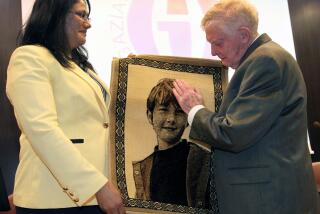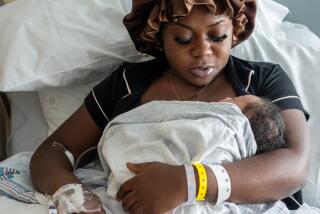Blacks Often Suspicious About Organ Transplants : Medicine: Many African-Americans refuse to donate, fearing that only Anglos would benefit. Some recipients try to dispel the myths and lessen the shortage.
- Share via
DALLAS — Cleo Goss has a new kidney, a new life and a new mission: To dispel the myths that some experts say keep blacks from becoming organ donors.
“It really hurt me that the black men in my family were so against it,” Goss said. “But some of them told me that they’ve been beaten down so long until they can’t help but think some Anglo person is going to take advantage of them again. They really believed that their organs would only be used to save the life of some rich, Anglo person.
“It’s a hurting thing to be trying to help and you see our people so negative about it.”
The gap between the number of people awaiting transplants and the number of organs available is wide among Anglos and Latinos, statistics show. But the numbers show an even wider chasm among blacks.
Partly, this is because blacks are three times as likely as Anglos to suffer from kidney failure, and they are affected more severely by the disease. Thus, nearly 2,000 of the more than 9,900 kidney transplants performed in 1991 went to blacks.
But the reluctance of blacks to donate their organs also plays a part.
Organs donated by blacks can be used in patients of all races, but they are more likely to provide a good match for blacks. And if blacks don’t donate, black patients are more likely to have prolonged waits for the kidneys and other organs they need.
For Goss, luck fueled her good fortune as much as anything else--she had six daughters who each were willing to give her one of their kidneys.
“My girls were with me at the hospital when the doctor came into my room and asked, ‘Which one of you young ladies is going to give your mother a new kidney?’ ” Goss said. “And when they all stood up, that made me feel special.”
Ten days after receiving a kidney from one of them, she was back home.
The number of black donors is rising, albeit slowly in comparison to black need for transplants. Ten years ago, about 2% of all organs donated nationwide came from blacks.
That figure climbed to about 10% in 1991, according to statistics compiled by the United Network for Organ Sharing, a nonprofit agency contracted by the U.S. Department of Health and Human Services to oversee the nation’s organ procurement and transplantation network.
Latinos made up about 7.5% of all donors, and Asians about 1%. Anglos made up more than 80% of all donors.
To boost minority numbers, organ procurement experts say they must help potential donors overcome cultural, religious and psychological fears.
“I often hear that blacks sometimes say, ‘Are they going to transplant those organs into white people?’ And the answer is yes and no. We’ll simply transplant to the next person on the waiting list, whether white or black,” said Dr. Ingemar Dawidson, associate professor at the University of Texas Southwestern in Dallas.
Some blacks believe that doctors might not work as hard to save their lives or the lives of their loved ones if they reveal plans to donate their organs, Dawidson said.
At Parkland Memorial Hospital in Dallas, officials are trying to remove those barriers for potential donors.
Last year, the Southwest Organ Bank began training some of Parkland’s Health Unit Coordinators, many of whom are black, for a project to educate donor candidates.
Parkland has a patient population that is 39% black, but 75% of the black families approached last year rejected pleas to donate organs, said Marsha Exley, marketing coordinator for Southwest Organ Bank.
“I would like to do a 65% consent rate, but that’s really tough,” Exley said. “I think generally people support the concept of organ donations, but there are a lot of misconceptions to overcome.”
Parkland had 27 organ donors in 1991 and ranked first among the nation’s major county hospitals in organ procurement. Chicago’s Cook County Hospital was second with 14 and Ben Taub in Houston ranked third with 9.
Mary Ann Wirtz, spokeswoman for the United Network for Organ Sharing, said the Richmond, Va.-based agency has no program aimed at attracting minority donors. But UNOS assists several groups that have such programs, she said.
Dr. Paul Cunningham, a transplant surgeon at East Carolina University in Greenville, N.C., is heading a minority subcommittee seeking to determine for UNOS why there are so few black donors.
“We’re tackling a difficult issue,” he said. “It’s one that’s avoided an answer for many years and remains elusive.”
The committee, formed about a year ago, will solicit information from each of the 200 or so transplant centers in the United States, Cunningham said. Their opinions, he said, could be used to establish a plan that might lead to additional minority donors.
Meanwhile, the University of Miami Transplant Program, one of the nation’s most successful, is working to encourage more Latino organ donors.
The university works with about 100 hospitals to obtain organs from people near death. The statistics they have compiled show that there is still a lot of work to do.
In 1991 in South Florida, 37% of the transplant recipients--but only 13% of the donors--were Latino, and 30% of the recipients and 10% of the donors were black. Anglos were among 33% of the recipients, compared to 77% of the donors.
To help close this gap, the South Florida Transplant Foundation helped a drugstore chain coordinate an organ-awareness campaign targeting Latinos. Brochures on organ donations were printed in Spanish and English and distributed at Walgreen’s Drug Stores in the region.
“We feel that education is the key, and the campaign got people talking and thinking about organ donations,” said Vicky Castro, a spokeswoman for the foundation. “A lot of Hispanics and blacks don’t really think about donating organs until a tragic moment comes.
“By then, it’s very difficult to approach someone grieving a lost relative and talk about organ donation.”
Dawidson, who heads Parkland’s transplant program, said some hospital personnel can botch an opportunity to procure donations by approaching family members too soon.
“If you do that, the family will never consent, and I don’t blame them,” he said. “You have to have someone who is used to doing it and trained to do it.”
Mary Walker didn’t know much about kidney transplantation before she registered on the UNOS national waiting list. But after receiving her new kidney in October, 1985, she decided to learn more.
Walker has been spreading the word about organ and tissue donation through the Denver-based Black Transplants Action Committee, which she formed in 1991.
Her group of 19 volunteers works to inform blacks of their need for kidney transplantation and the need for black donors.
“I think it’s important to have a group that knows the black community and speaks to it,” Walker said. “You can reach this community, but you have to work at it.”
Organ Donors by Race
Here is a breakdown along racial lines on those who donated organs in 1991:
Kidney liver Pancreas Heart Heart/Lung Lung Anglo 81.1% 80.5% 83.4% 80.3% 81.6% 79.9% Black 9.9 10.0 7.9 9.9 8.2 11.6 Latino 7.1 7.8 7.1 8.2 8.2 7.3 Asian 0.9 0.9 1.0 0.8 2.0 0.3 Other 1.0 0.8 0.6 0.8 0 0.9 TOTAL RACE IN 1991 4,272 3,166 1,069 2,148 51 345
Multiple Organs Anglo 80.7% Black 9.8 Latino 7.7 Asian 0.9 Other 0.9 TOTAL RACE IN 1991 3,445
Source: United Network for Organ Sharing
More to Read
Sign up for Essential California
The most important California stories and recommendations in your inbox every morning.
You may occasionally receive promotional content from the Los Angeles Times.













